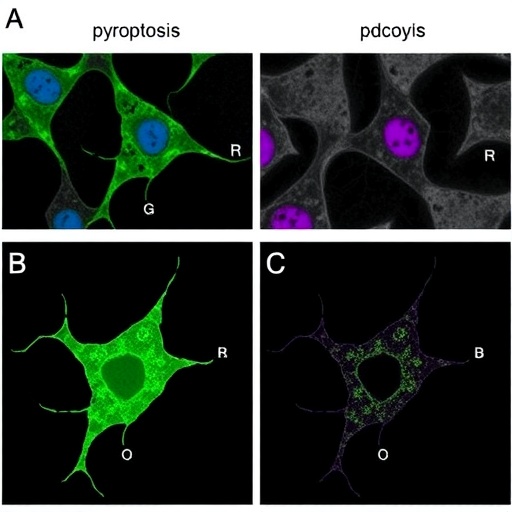
In a groundbreaking study, researchers have unveiled a significant mechanism by which postnatal skeletal muscle maintains its structural integrity and functional performance. This study, spearheaded by a team of neuroscientists and biomedical researchers, delves into the realms of mitophagy and proteasomal degradation. These cellular processes appear to play pivotal roles in averting developmental defects associated with muscle tissue in the postnatal phase. The implications of these findings extend well beyond superficial understandings, providing a deeper insight into muscle biology and potential therapeutic approaches for muscle-related disorders.
Mitophagy, the process by which damaged or dysfunctional mitochondria are selectively degraded, has garnered attention over the past few years. Mitochondria are known as the powerhouses of the cell, crucial not just for energy production but also for regulating various metabolic pathways. When they become dysfunctional, the repercussions can be severe, leading not only to decreased ATP production but also to increased oxidative stress within the muscle cells. The research team, led by F.A. Rahman, postulates that the activation of mitophagy offers a necessary salvage mechanism for these cells, crucial during the developmental stages when rapid growth and adaptation occur.
In the context of postnatal muscle growth, ensuring the health of mitochondria becomes paramount. The study demonstrates how enhanced mitophagic activity leads to the removal of defective mitochondria, thereby improving the overall metabolic capacity of muscle tissue. This is achieved through intricate cellular signaling pathways that respond to various stressors and metabolic demands. The researchers discovered that the upregulation of specific proteins associated with mitophagy correlates with resilience against developmental anomalies, effectively ensuring that skeletal muscle tissue does not succumb to the detrimental effects of metabolic disturbances.
In parallel to mitophagy, the study also emphasizes the role of the proteasome, a cellular complex responsible for degrading ubiquitinated proteins. Proteins that are damaged or misfolded must be efficiently removed to maintain cellular homeostasis, especially in rapidly growing tissues like skeletal muscle. The team’s findings advocate that heightened proteasomal activity complements mitophagy, together forging a robust defense mechanism that counters the onset of developmental defects. This is particularly vital during the postnatal period, given the extensive physiological adaptations that skeletal muscle undergoes during early life stages.
The results of this investigation have broad implications for understanding muscle development and associated disorders. Conditions such as muscular dystrophy or age-related sarcopenia often stem from compromised mitochondrial function and protein mismanagement within muscle tissues. By elucidating the underlying mechanisms that permit the postnatal skeletal muscle to effectively manage its cellular integrity, this research opens the door to innovative therapeutic strategies. For instance, enhancing mitophagic activity or stimulating proteasomal pathways may serve as potential interventions for muscle-wasting diseases, fostering recovery and restoration of functional muscle mass.
Furthermore, the study’s results suggest that both genetic and environmental factors could influence the degree of mitophagy and proteasomal degradation within skeletal muscle. This introduces an exciting avenue for future research exploring how lifestyle choices, nutritional interventions, or exercise regimes could modulate these cellular processes. The interplay between lifestyle factors and cellular health could lead to personalized strategies aimed at optimizing muscle growth and mitigating developmental defects.
Central to these discussions is the concept of cellular resilience. The ability of skeletal muscle to adapt and respond to various stressors is not merely a reflection of mitochondrial and protein management but reflects a more intricate crosstalk among various cellular pathways. As cellular stressors increase, the activation of protective mechanisms like mitophagy and proteasomal degradation could represent a pivotal evolutionary advantage, enabling organisms to thrive despite adverse conditions. This perspective encourages a holistic view of muscle health, emphasizing the importance of integrating cellular processes into broader physiological contexts.
Another crucial element stemming from this research revolves around therapeutic applications. The understanding that targeted modulation of mitophagy and proteasomal activity can promote muscle integrity presents a tantalizing prospect for drug development. Future studies could pave the way for pharmacological agents designed to activate these cellular processes, providing an avenue for the treatment of age-related muscular decline or other myopathies. Researchers may explore small-molecule drugs or biopharmaceuticals that can stimulate these pathways and evaluate their efficacy in clinical trials.
Equally important in this discussion is the potential for preventive strategies. Insights gained from this study could inform public health campaigns targeting physical activity and nutritional balance during critical growth periods. Encouraging behaviors that promote mitochondrial health and protein turnover, such as regular exercise and a balanced diet rich in antioxidants, could foster resilience against developmental defects in muscle tissues.
As this research continues to reverberate throughout the scientific community, it raises essential questions about the future of muscle bioengineering. Understanding the cells’ self-cleaning mechanisms and how they can be enhanced or preserved will be critical as the field of regenerative medicine evolves. Stem cell therapies, tissue engineering, and gene editing could all benefit from insights gained regarding how to fortify muscle cells against common defects.
Notably, this research underscores the idea that muscle health is a multifaceted challenge. Rather than focusing solely on one aspect of muscle function or growth, it becomes evident that an integrative approach that considers mitochondrial dynamics, protein homeostasis, and external influences is necessary for a comprehensive understanding of muscle development and health.
In conclusion, the groundbreaking research conducted by Rahman et al. reveals vital insights into the cellular mechanisms that underpin muscle resilience during postnatal development. The interplay between mitophagy and proteasomal degradation provides a robust framework for understanding how muscle cells adapt to stress and maintain functionality. These findings have far-reaching implications for treating muscle-related disorders, emphasizing the importance of fostering cellular health through targeted interventions. As the body of evidence supporting these insights continues to grow, the scientific community remains poised on the brink of a new era in muscle biology.
Subject of Research: Mechanisms of muscle resilience and developmental integrity in postnatal skeletal muscle.
Article Title: Activation of mitophagy and proteasomal degradation confers resistance to developmental defects in postnatal skeletal muscle.
Article References:
Rahman, F.A., Graham, M.Q., Truong, A. et al. Activation of mitophagy and proteasomal degradation confers resistance to developmental defects in postnatal skeletal muscle.
J Biomed Sci 32, 77 (2025). https://doi.org/10.1186/s12929-025-01153-7
Image Credits: AI Generated
DOI:
Keywords: Muscle resilience, mitophagy, proteasomal degradation, developmental defects, skeletal muscle, postnatal development.
Tags: cellular processes in muscle developmentdevelopmental defects in muscle tissueenergy production in muscle cellsmitochondrial dysfunction and muscle performancemitophagy in postnatal muscle healthneuroscientists studying muscle healthoxidative stress in muscle cellsproteasomal degradation in muscle integrityresearch on muscle growth and adaptationrole of mitochondria in muscle biologyskeletal muscle maintenance mechanismstherapeutic approaches for muscle disorders




